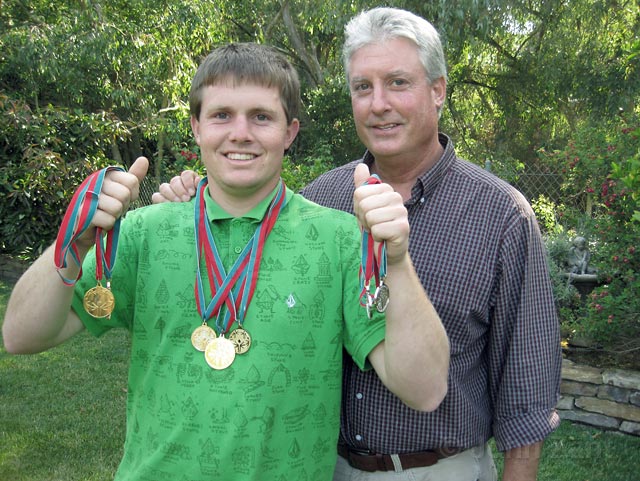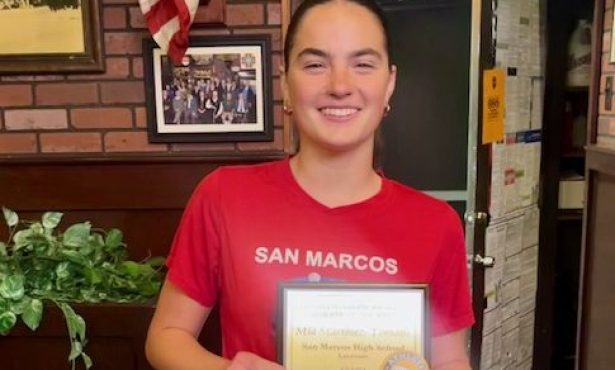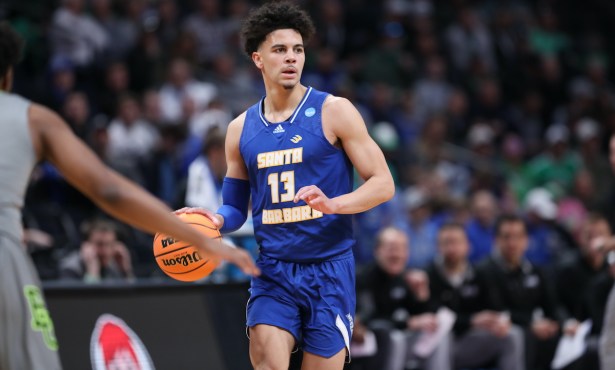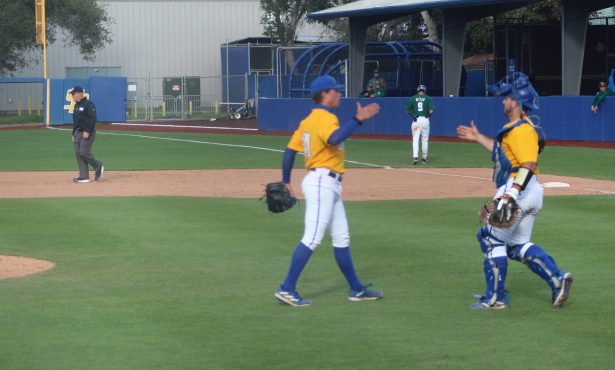Brad Ebner Wins Gold
Former DP High School Footballer Survives Brain Injury, Earns Medals in Special Olympics Track-and-Field

It has been a long, slow journey on the road to recovery for Brad Ebner, survivor of a traumatic brain injury (TBI) in a football game almost five years ago. But on the track at Cal State Long Beach last Sunday, he unleashed a surprising burst of speed.
Ebner was a standout among more than 1,000 athletes who participated in the 42nd annual Summer Games hosted by Special Olympics Southern California. He was a gold medalist in the 100-meter dash and also brought home medals for running the 200 and the anchor leg on Santa Barbara’s mixed 400 relay team.
“It was kind of fun,” Ebner said, displaying the bling-bling he collected in his first year as a Special Olympian. “Come on, you can do better than that,” prodded his father, Chuck. “It was awesome, exciting,” Brad said.
“This guy, more than anything, likes to compete,” Chuck said. “He shows it playing cards and Monopoly. It engages his thought process more than anything. It keeps him focused. The Special Olympics put him on Cloud Nine. He was more like his old self.”
“Want to see me run?” Ebner asked. Leading us out to the quiet street in front of his mother’s house, he walked with a limp. A faulty neural connection to his right foot is one of the physical reminders of his brain injury. He crouched slightly at an imaginary starting line, and then took off sprinting toward the end of the street. The limp disappeared as if he’d shifted out of a broken gear.
That’s how Ebner ran with a football under his arm as Dos Pueblos High’s senior running back, averaging 150 yards a game before he plowed into several Righetti High tacklers in the fourth quarter of a game on September 29, 2006. That changed his life forever. He underwent brain surgery that night, spent more than a week in an induced coma, and came out of it a child again.
Chuck and Cheryl Ebner suddenly had their expectations as parents turned upside down. Father’s Day and Mother’s Day have new meaning for them. On the verge of becoming a man, their oldest son needed constant care and attention as he progressed through various rehabilitative and therapeutic programs. They are divorced, but they made it work by sharing responsibilities and taking him into their homes on alternate days. They found a treasure trove of resources in the community.
“It’s amazing how many things Santa Barbara has for kids like him,” Chuck said. Ebner recently graduated from a transition program at SBCC, where he learned basic skills that he will need to eventually live independently. Another valuable resource is the Jodi House, a meeting ground for people with brain injuries. “It’s one place he goes where people really relate to him,” Cheryl said.
Brittany Ebner, a junior at Dos Pueblos, found herself in a radically different relationship with her older brother. “He’s the opposite of how he used to be,” she said. “He used to be quiet; now he’s outgoing. He was shy; now he has a girlfriend. He bugs me a lot more. I’ll mess with him in return.”
Ebner’s injury loosened his self-control, and he tends to get carried away with things. “Knuckle … knuckle … knuckle,” he said, thrusting his closed fist out for his family to touch. Then he extended both fists and said, “Dos knuckles.”
“I’m a patient guy,” Chuck said. “He likes to test it all the time.” In an important way, his son’s exuberance in the wake of his trauma is a good thing. “There’s a 50-50 chance of having a happy life or going the other way and being miserable,” Chuck said. “Fortunately, Brad is happy.”
Stephanie Winegardner, coach of Santa Barbara’s Special Olympics track athletes, said Ebner was an enjoyable addition to the team. “He’s so sociable,” she said. “He’s always asking people’s names, giving high fives. And he’s ridiculously fast compared to the other runners.”
The Ebners cooperated with an L.A. Times reporter to tell their story as part of a package about concussions in football that was published last fall. “We did it to make people aware of the impact of these injuries,” Chuck said. He played football himself and remains a fan of the sport, but he thinks it can be made safer. “I’m happy to see the NFL getting more involved,” he said, noting the league’s crackdown on helmet-to-helmet blows. There is now more research into the causes and treatment of head traumas.
A year ago, the CIF instituted a rule that empowers a high school referee to keep a player he suspects of a concussion off the field. While some game officials were reluctant to take that responsibility, an effect of the rule has been to increase the vigilance of coaching staffs, players, and parents.



